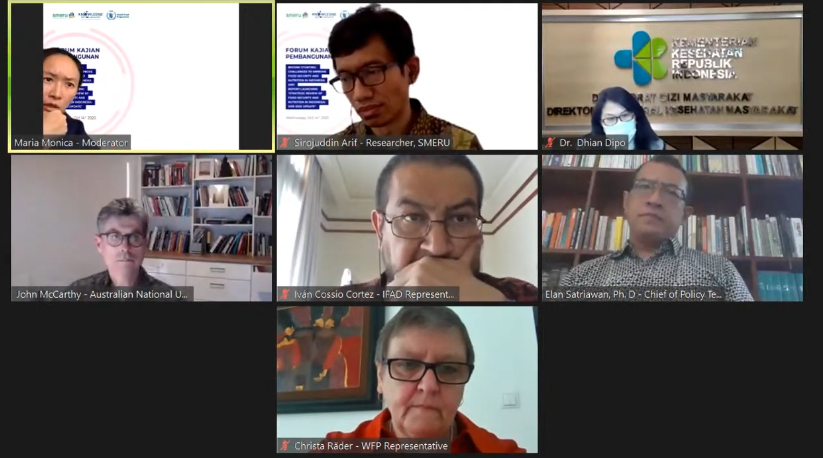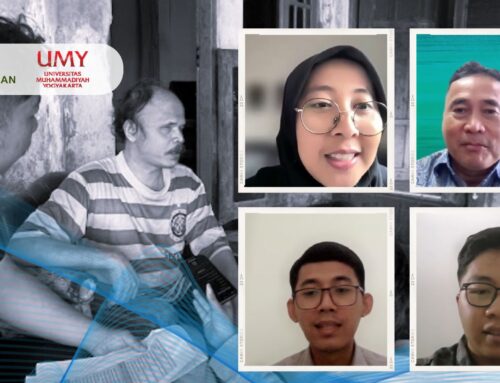FKP hosted by The SMERU Research Institute with Christa Räder (World Food Programme), Iván Cossio Cortez (International Fund for Agricultural Development), Celvya Betty Manurung (The Vice President’s Office), Dr. Bambang Widianto (Executive Secretary, TNP2K) Sirojuddin Arif (The SMERU Research institute), Elan Satriawan (TNP2K), Kirana Pritasari (Ministry of Health), and John McCarthy (The Australian National University).
KEY POINTS:
- The current nutritional status of Indonesians is still low by international standards and the COVID-19 pandemic worsen existing food and nutrition problems. Dietary quality has deteriorated especially among the poor and vulnerable, and health services are heavily disrupted.
- The nature of food security varies across the regions and people face different challenges which makes one size fits all policy not be effective in tackling the problems. Nutritional outcomes are shaped not only by food systems but also by processes of social and economic change which means food policies need to be integrated into broader strategies of social policy and economic development
SUMMARY
- Even though access to food has increased and undernutrition continued to decrease over the last few years, the current nutritional status of Indonesians is still low by international standards. Indonesia is thus facing a triple burden of malnutrition in which undernutrition co-exists with overnutrition and micronutrient deficiencies.
- The SMERU Research Institute, World Food Program (WFP), and Presidential Delivery Unit for Development Monitoring and Oversight (UKP4) developed a strategic review of food security and nutrition in Indonesia in 2014 and the report was recently updated for 2019-2020 and is launched in this webinar. Challenges remain for food security in Indonesia because of poverty and lack of diverse diets. There is a strong focus on rice consumption and increasing consumption of processed food high in carbohydrates, sugar, and salt. In addition, while still struggling to address long-standing food security and nutrition challenges, Indonesia is currently facing an unprecedented crisis triggered by the COVID-19 pandemic. Based on the strategic review by The SMERU Research Institute, evaluation of previous programs, United Nations sustainable development cooperation framework, and government plan, the WFP formulated a new country strategic plan for 2021-2025, which will focus on engaging in policy dialogue and technical assistance in the areas of evidence generation on food security, emergency preparedness and adaptation to climate change, and promotion of a diverse and healthy diet to prevent stunting and malnutrition.
- IFAD also shares the same concern over the situation of food security in Indonesia. However, one important feature that IFAD saw in Indonesia and other regions is that there are many cases of small farmers in an important portion of the rural population that are going back to traditional and more healthy and nutritious food. Although one can not be over-optimistic about this feature, especially in the context of COVID-19 pandemic, it is important to continue to help those farmers to be more resilient to climate change and productivity shocks.
- The strategic review reports current state of local & national programs, the gaps in strategy and data, the impacts of COVID-19 pandemic on food security, and the required measures to accelerate progress towards achieving zero hunger by 2030. Data was collected through interviews and focus group discussions, analysis of latest secondary data, and fieldwork in Nusa Tenggara Timur and East Java. Some of the key findings are:
- The number of undernourished people is still large and food intakes are far from ideal. About 20 million people are still at the risk of hunger. Carbohydrates still dominate food intake and protein consumption increased, but remain unequal between income groups. Fruit and vegetable consumption is still low by international standards. During the last 5 years nutrition has improved quite significantly as shown by the decreasing number of stunting, but it is still above international standard (20%). Also the reduction in stunting is unequal across regions, many of them still have a high prevalence of stunting. Besides undernutrition, overnutrition also increased. Interestingly, the overnutrition growth rate in Indonesia is higher among the poorest quintile of the population and not confined to urban areas. Hidden hunger prevalence such as anemia is still increasing among children under 5 and pregnant women.
- The government relied on social affordability of food to maintain food access. There is a reliance on social protection programs (PKH, BPNT). Although the program has become more nutrition sensitive, challenges to increase nutritional status remain due to lack of knowledge and awareness about nutritious foods. The social protection programs also suffer from targeting flaws which can make the impact ineffective.
- The pandemic may worsen nutrition problems that already existed prior to pandemic such as low birth weight, low immunization completion rate, low food supplement for mothers and children under 5, and high rate of anemia among pregnant mothers. COVID-19 also disrupts access to nutrition due to logistical disruption and countries’ precautionary action to secure domestic supply. Indonesia domestic food prices are comparatively higher relative to other countries which explain the lower access and consumption of nutritious food.
- The government’s response to the pandemic is largely through expansion of social protection programs. However, Indonesia’s budget for COVID-19 social protection is still lower than other countries and the implementation still suffers from problems ranging from delays in the delivery of the benefits to mistargeting of the program.
- What needs to be done to improve food security? Closely monitor the rice stock, pursue a more flexible trade policy, make timely import adjustments when necessary, and maintain farmer incentive to uphold food production. Continue to provide the critical community-based nutrition services using innovative or digital delivery systems for basic services. Increase the access to diverse and healthy food by strengthening local supply chain and regulating unhealthy foods. Ensure emergency food distribution and safety net programs. The government needs to ensure that all poor and vulnerable groups receive sufficient social assistance. It is also important to expand the provision of supplementary foods. Access to health care, clean water needs, and sanitation need to be improved to address food utilization problems since these are the basic requirements for a healthy human condition.
- There are some important issues insufficiently covered in the report, including:
- while poverty and the number of food insecure households are decreasing, micronutrient deficiencies and stunting have not been decreasing as quickly as expected;
- a diverse perspective in approaching the issue such as through anthropological or sociological perspective;
- focus on a one size fits all policy, might not be effective to tackle the problem since people are vulnerable for different sorts of reasons, and it requires different solutions;
- the changing nature of poverty where people have lost their subsistence capacity to live off agriculture and where livelihoods have got more commodified. There is also ecological decline which makes them unable to harvest the way they used to;
- lack of a clear strategy to answer some of the problems, for example the steps needed to diversify diets and livelihoods, to address the impacts of climate change, to support landless farmers, and to improve nutrition awareness.
- In conclusion, nutritional outcomes are shaped not only by food systems but also by processes of social and economic change. Food policies need to be integrated into broader strategies of social policy and economic development. Indonesia needs to develop regional responses that build on local institutions and knowledge. We need to move beyond national programs that focus on Indonesia as a whole, and try to address the problems in rural context and production systems.
Finally, congratulations to the World Food Programme for being awarded the Nobel Prize for Peace “for its efforts to combat hunger, for its contribution to bettering conditions for peace in conflict-affected areas and for acting as a driving force in efforts to prevent the use of hunger as a weapon of war and conflict.”





